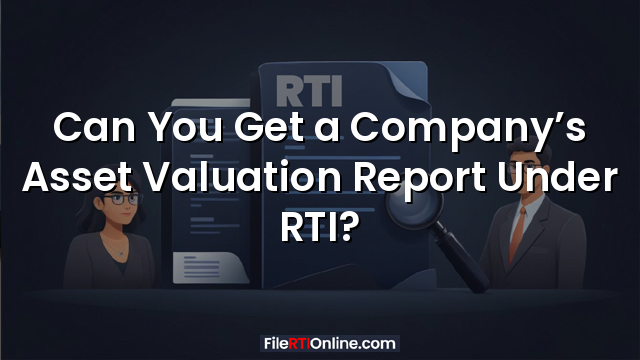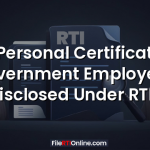Can You Get a Company’s Asset Valuation Report Under RTI?
Understanding When Commercial Information Is Exempt
When companies go into liquidation or face legal proceedings, a lot of documents—asset details, debtor lists, valuation reports—come under the custody of the Official Liquidator or another government body. Many people file RTI applications hoping to access these documents.
But a common question arises:
Can the valuation report of a company’s assets be obtained through RTI?
Or more broadly:
Can commercially sensitive corporate documents be demanded under the RTI Act?
Let’s understand the legal position, with a real Central Information Commission (CIC) case as an example.
Are Company Valuation Reports Disclosable Under RTI?
Generally, no.
A valuation report is treated as commercially sensitive information.
It falls under:
- Section 8(1)(d) — commercial confidence, trade secrets, or intellectual property, if disclosure would harm the competitive position of a third party.
Unless the requester shows larger public interest, such documents need not be disclosed.
Why Valuation Reports Are Protected
Valuation reports usually contain:
- confidential financial details
- asset pricing
- liquidation strategies
- business-sensitive assessments
- market value analysis
These details, if disclosed, can:
- affect ongoing liquidation proceedings
- influence bidding prices
- expose confidential strategies
- impact stakeholders’ commercial interests
Therefore, such information is normally exempt from disclosure.
Real CIC Case Example: Applicant Seeking Liquidation Valuation Report
What Happened?
An RTI applicant sought extensive information from the Official Liquidator regarding a company under liquidation, including:
- actions taken
- details of directors
- debtor information
- claims and proceedings
- and specifically, the valuation report of the company’s assets
The PIO allowed inspection and provided 85 pages after collecting the required fee.
However, the applicant’s real intention was to obtain the valuation report, and the matter reached the CIC.
Arguments Made During the Hearing
Applicant
He stated that he mainly needed the valuation report of company assets.
Official Liquidator / Respondent
They explained:
- The company was in liquidation under High Court orders.
- Valuation reports are commercially sensitive.
- Disclosure is exempt under Section 8(1)(d).
- Another CIC case had already held that valuation reports in liquidation are commercial secrets.
- No larger public interest had been shown.
They also returned the extra fee the appellant had paid.
CIC’s Decision
The Central Information Commission ruled:
- Valuation reports are protected under Section 8(1)(d) as commercial confidence.
- The Official Liquidator is not obligated to disclose such documents.
- The appellant failed to establish larger public interest.
- Therefore, the report cannot be disclosed under RTI.
What This Means for You
✔ You can get many liquidation-related documents
Such as:
- order copies
- claim details
- action-taken reports
- correspondence
- inspection of publicly available files
❌ But you cannot get valuation reports or commercially sensitive data
Unless you can strongly prove larger public interest, which is difficult in most cases.
❌ RTI cannot be used for:
- business advantage
- private disputes
- personal financial interests
- getting internal strategy documents
When Can a Valuation Report Be Disclosed?
Disclosure is possible only if:
- the competent authority (like Official Liquidator / Court) is satisfied, and
- there is larger public interest (e.g., major fraud, large-scale public money loss)
Such cases are rare.
Conclusion
Valuation reports of companies—especially those under liquidation—are treated as commercially confidential documents under the RTI Act. The CIC has consistently held that these are exempt unless there is overwhelming public interest.
The discussed CIC case reinforces the principle that RTI cannot be used to access corporate-sensitive information merely for personal curiosity or private disputes.


